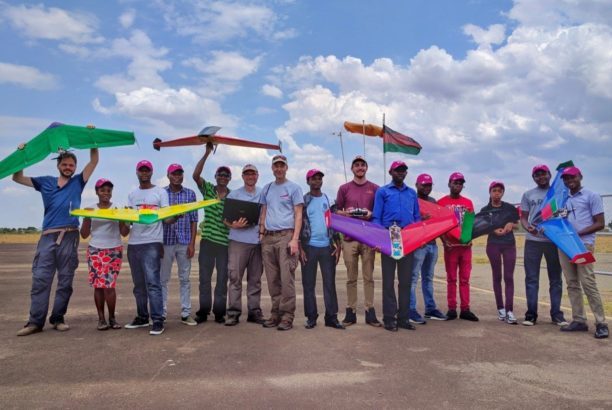
The UNICEF drone testing corridor has generated major interest from research teams who want to use the corridor to test ideas in bringing drone technology to developing countries. Virginia Tech reports that their research team has designed a drone that could be built by Malawians and flown for medical delivery in a “low resource environment.”
Virginia Tech’s mechanical engineering’s Unmanned Systems Lab designed the EcoSoar: a $350 aircraft made out of foamcore posterboard and 3D printed parts built to carry medical supplies. But the design was proven on the ground when 13 students from the Malawi University of Science and Technology (MUST) worked with Virginia Tech graduate students Zack Standridge in aerospace engineering and James Donnelly of mechanical engineering, and Kevin Kochersberger, an associate professor in mechanical engineering, to build 5 EcoSoar drones as part of a 2-day workshop.
“EcoSoar was designed with low-resource environments in mind,” said Kochersberger. “I envision entrepreneurs in Malawi establishing businesses around the use of this aircraft – building, operating, and maintaining EcoSoar for both medical deliveries and environmental assessment activities.”
EcoSoar can carry a payload of 4.5 ounces and can carry camera equipment in addition. The drone flew a successful 1 km beyond visual line of sight (BVLOS) flight carrying simulated medical supplies.
“It is extremely rewarding to see my design successfully recreated, and seeing the local students’ excitement in their work only adds to my own enthusiasm for the project,” Standridge said.
“It was truly inspiring to see a Malawi-manufactured drone built only by students under Virginia Tech guidance,” said Michael Scheibenreif, drone corridor lead with UNICEF. “This could have the potential to deliver medicine to remote and hard to access communities and is a great example of how important it is to build local capacity in the drone sector. If we can build an ecosystem of drone experts locally, we can ensure these solutions are sustainable and embedded within the communities they service,” Scheibenreif said.
“Kochersberger said he plans to return to Malawi in 2018 with a production-ready version of EcoSoar that will be adopted by the innovators who attended the workshop,” says the Virginia Tech announcement.
Miriam McNabb is the Editor-in-Chief of DRONELIFE and CEO of JobForDrones, a professional drone services marketplace, and a fascinated observer of the emerging drone industry and the regulatory environment for drones. Miriam has penned over 3,000 articles focused on the commercial drone space and is an international speaker and recognized figure in the industry. Miriam has a degree from the University of Chicago and over 20 years of experience in high tech sales and marketing for new technologies.
For drone industry consulting or writing, Email Miriam.
TWITTER:@spaldingbarker
Subscribe to DroneLife here.
